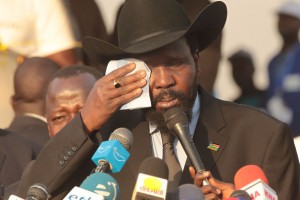By Ryan Aliman
Impunity Watch Reporter, Africa
WINDHOEK, Namibia – Namibian Police ordered an Apostolic Faith Church pastor at a Sauyemwa informal settlement in Rundu to unchain mentally impaired patients the Church was reportedly treating on the premises. The police found nine people bound to heavy metal objects and wooden posts. One of the patients said he had been confined in the Church for more than a year.

The police confiscated all the chains that were used to tie up the patients. However, the officers met resistance from the patients’ relatives who were convinced that the patients were merely being treated; and that the patients’ detention was a necessary part of the spiritual healing the Church offered. The Church’s treatment consisted of prayer, water, and olive oil with the patient chained to a heavy object.
The police launched an investigation on the Church’s activities after the Apostolic Faith Church gained popularity as a “clinic” of sorts for people with different afflictions who go to the church seeking “divine intervention”.
It was revealed that the Church would detain “aggressive patients” by chaining them to trees and rocks. These patients, some of them from the neighboring Angola, were kept in chains for the whole duration of their treatment at the Church.
According to Reverend Moses Matyayi, the pastor in charge of the Apostolic Faith Church in Sauyemwa, the chains were necessary as the patients posed a danger to the community. In fact, he added, this practice has been observed for over a decade.
Reverend Matyayi further claimed that not only have the relatives of the patients consented to this practice, but they have also supplied the Church with chains to be used on their mentally ill kin.
Upon examination by the Namibian Police, the relatives explained that they turned to the Church because State hospitals allegedly did nothing to improve their family members’ conditions.
The police however saw the treatment less favorably and ordered Reverend Matyayi to release the patients on the ground that the latter’s treatment violated fundamental human rights and was thus illegal. The police arranged for the patients to be sent to the Rundu State Hospital psychiatric unit in Windhoek.
Deputy Commissioner Willie Bampton noted that “although Reverend Matyayi’s intentions were good, his method of chaining people was cruel and inhumane”. Bampton added that chaining mentally handicapped individuals “robbed the patients of their dignity”.
Chief Social Worker in the Ministry of Gender Equality and Child Welfare, Fransiska Hamutenya, weighed in by describing the whole situation as “degrading”. “If someone is mentally ill it does not take away his or her rights. This is abuse,” she said.
For further information, please see:
The Namibian – Namibia: Police Order Church to Unchain – 1 June 2012
Nampa Mobile News – Police Order Church to Unchain – 31 May 2012
New Era Newspaper – Namibia: Rev. Warns Against Foreign Prophets – 31 May 2012
New Era Newspaper – Namibia: Church Chains Followers – 30 May 2012



